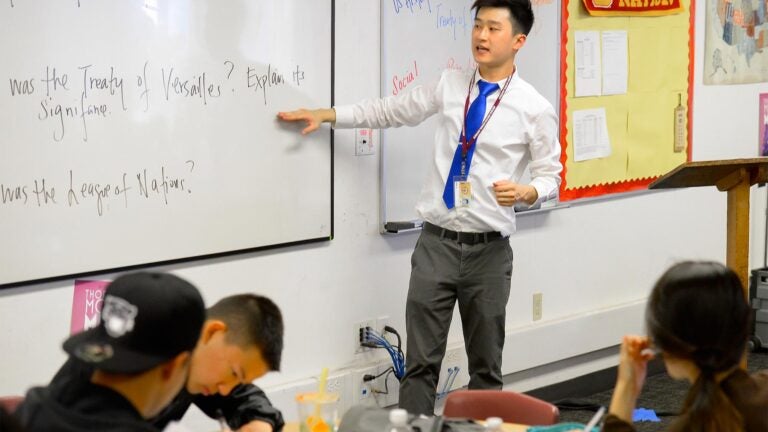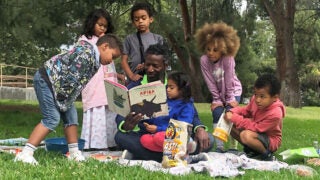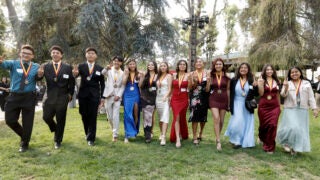
Matthew Wong teaches a history class at Arcadia High. (USC Photo/Gus Ruelas)
Fulbright teaching assistant brings back lessons from Taiwan
Teaching English overseas makes USC Rossier alum an ideal choice for social studies classes at Arcadia High
Matthew Wong MAT ’13 knew his nine-month term as a Fulbright English teaching assistant in Taiwan would reap rewards throughout his life, but he never thought he’d be using the lessons he learned so quickly.
Just weeks after he returned to Los Angeles from Taipei, he landed a job teaching history at Arcadia High School, demonstrating how USC students who land Fulbright awards come back with new perspectives as well as new skills and valuable experience.
Wong, who earned his Master of Arts in Teaching from the USC Rossier School of Education two years ago, found that his experience teaching English through the Fulbright program made him a great match for Arcadia High’s “sheltered” social studies classes. These classes are specially designed to teach U.S. and world history to the school’s 175 English learners. Most come from China and speak Chinese as their first language, according to the school’s Accountability Report Card.
This is where Wong’s recent stint teaching within the Chinese school system comes in handy. In Taiwan, Wong co-taught middle school classes with five local teachers who helped him navigate and adapt to their style of teaching, a skill he can use to help his new students acclimate to U.S. schools.
In Taiwan, learning is centered on lectures from the teacher. Students never doubt or question information they receive from their teachers.
Sonia Chan
“In Taiwan, learning is centered on lectures from the teacher. Students never doubt or question information they receive from their teachers,” said Sonia Chan, who coordinates the English teaching assistant program for Fulbright Taiwan. “This changes when teaching assistants like Matthew join the classroom. The students can start to learn as a group, sharing opinions, discussing the questions and finishing projects together.”
Making adjustments
Wong and his co-teachers had to make adjustments and take risks to make the more interactive approach work.
“At the start, the students were very respectful and polite, but also very quiet in class. They rarely spoke up or answered questions, even if they knew the answers,” Wong said.
Wong quickly bonded with his co-teacher, Jay Chen MAT-TESOL ’09, over their shared Trojan Family connection, though their paths had not crossed before Wong was assigned to Chen’s classroom in Taipei.
Together, they worked to find teaching activities that bridged the cultural and language gaps, creating a more active learning environment. Chen translated concepts into Chinese when needed, explaining the cultural differences to the students to spur their participation.
“In the beginning, the students were like guests in the classroom watching a show because they could barely understand Matt,” Chen said.
Acting as an ambassador between the two different teaching styles, Chen encouraged the students to share their opinions and speak up in class in English, even if they made errors or misspoke.
It was very challenging, but it really opened my eyes to new approaches to teaching.
Matthew Wong
“It was very challenging, but it really opened my eyes to new approaches to teaching,” Wong said. “In particular, I learned a lot about language acquisition. That is, how to help students learn a new language, using music or having them read along to increase comprehension.”
Top-down teaching
With his students at Arcadia High, Wong is mindful of their past experiences in non-U.S. school systems and their significant cultural differences. He hopes to help his new students bridge the gap from the top-down classroom instruction they are accustomed to, and the more open and participatory discussions they can expect in U.S. classrooms.
“As a new teacher, I have to honestly say that it’s challenging every day,” Wong said. “The good news is that I know I am learning as I undergo this new experience.”
Wong, whose studies at USC Rossier were made possible by several scholarships, including the Hortencia M. Torres Endowed Scholarship, is the son of immigrant parents who didn’t graduate from college.
He wants to use his education to empower his students to engage in political processes and get involved in civic life — no surprise as his undergraduate degree from the University of California, Davis, is in political science and Asian-American studies. Colleagues in Taiwan believe he’ll be successful: Chan and Chen said Wong’s enthusiasm and commitment to teaching made a difference to his students.
“So many times, Matt sacrificed his lunch time to help those students who were originally left behind,” Chen said. “At first, they had difficulties reading a paragraph from the textbook. However, due to Matt’s effort, they dared to speak English freely in class no matter how difficult the questions were.
“He taught them that if they don’t give up on themselves, they could succeed.”
For his part, Wong is doing exactly what he wants to do. “All I’ve ever wanted to do is teach,” he said. “It’s so rewarding.”



